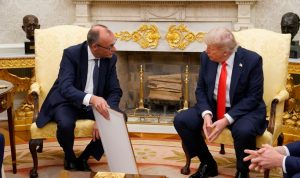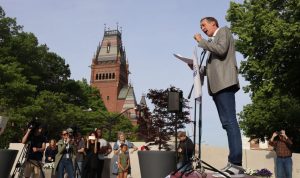Former U.S. National Security Advisor John Bolton: "Trump is in a difficult position."
DER SPIEGEL:Mr. Bolton, last Friday Israel began attacking Iran, a move for which you have long advocated. Were you surprised?
John Bolton:I have known Israeli Prime Minister Benjamin Netanyahu since his time as ambassador to the United Nations. He has been talking about destroying Iran's nuclear program for decades. Everyone knew this could happen.
The article you are reading originally appeared in German in issue 26/2025 (June 21st, 2025) of DER SPIEGEL.
DER SPIEGEL:What role did Donald Trump play in the attack?
Bolton:I don't think Trump was involved in the plan. Now, he's in a difficult position: He wanted to negotiate with Iran. He will have told the Israelis that he didn't want them to attack. And then they did it anyway.
John Bolton, 76, has worked for all Republican presidents since Ronald Reagan. In the first administration of U.S. President Donald Trump, he was National Security Advisor, before disagreements with the president led to his departure. Bolton is considered a foreign policy hawk and a supporter of military intervention.
DER SPIEGEL:What makes you think Trump was not involved in the attack?
Bolton:U.S. Secretary of State Marco Rubio said on Thursday night that it was a unilateral Israeli attack in which the United States was not involved. He would not have done that without consulting the president. But then Trump woke up on Friday morning and saw that the operation had been quite successful. Stock prices rose. So he said that he supported Israel and that the attack was excellent.
DER SPIEGEL:Trump says he gave the Iranians a 60-day ultimatum, which has now expired. Is that credible?
Bolton:It's now a matter of saving face and presenting himself as a key player. Trump knows that he plays a central role as U.S. president. He could send B-2 Stealth Bombers and bomb the underground facilities of Iran's nuclear program with bunker-busting bombs.
DER SPIEGEL:During the election campaign, Trump promised to keep the U.S. out of further wars in the Middle East.
Bolton:He would still prefer a deal. But above all, he wants to get back in front of the wave. It annoys him immensely that he is not currently leading the action. That is probably why he left the G-7 summit in Canada so abruptly.
DER SPIEGEL:Does Netanyahu take Trump seriously at all?
Bolton:His approach is pretty bold. But the Israelis have done similar things in the past. In 1981, for example, they attacked the Osirak reactor on the outskirts of Baghdad, the heart of dictator Saddam Hussein's nuclear program. The U.S. responded by agreeing to a UN Security Council resolution condemning the Israeli attack, that's how irritated they were. In 2007, when I was working for George W. Bush, the Israelis bombed an Iranian reactor in Syria, even though they had not received approval from us to do so.
DER SPIEGEL:Is Netanyahu only concerned with the nuclear program, or is he interested in overthrowing the government in Tehran?
Bolton:Netanyahu sees an opportunity for a change of power, because the Islamic Republic is weaker than it has ever been since its founding in 1979. Israel has reorganized the Middle East since the Hamas terrorist attack on October 7, 2023, and has inflicted one defeat after another on Iran and its allies.
Iran's Supreme Leader Ayatollah Ali Khamenei: "One defeate after another."
DER SPIEGEL:Could the Israelis destroy the Iranian nuclear program on their own?
Bolton:We don't know everything about this program. The two large facilities at Natanz and Fordo are located deep underground. The Americans could easily neutralize Natanz. Israel would have to bomb the facility bit by bit with smaller bombs. The most difficult thing is to destroy the facility in Fordo. The Israelis can't do that. They can only block the entrances again and again. But Fordo is much smaller than Natanz. So if the Israelis take out Natanz, that's the end of the program, at least the part we know about.
DER SPIEGEL:Are you saying there's another part?
Bolton:My biggest concern is that parts of Iran's nuclear program are located under a mountain in North Korea.
DER SPIEGEL:Is there any evidence for that?
Bolton:North Korea provided Scud missiles (editor’s note: Soviet-designed surface-to-surface ballistic missiles)to the Islamic Republic as early as the beginning of the 1990s. Since then, both countries have been developing delivery systems. We also know that the North Koreans have built a reactor in Syria together with the Iranians. Of course, we will only have proof once the ayatollahs are no longer in power and we can examine the documents in Tehran.
DER SPIEGEL:You are saying that even if Israel destroys Iran's nuclear facilities militarily, only regime change can permanently avert the danger?
Bolton:I have been dealing with the threat from Iran for 25 years. As long as the ayatollahs can, they will support terrorism, set up missile programs, and develop nuclear weapons – that is part of their ideology.
DER SPIEGEL:Regime change, especially when forced from outside, has rarely brought peace and stability to the Middle East in recent decades.
Bolton:There are different scenarios for Iran. The leadership could fall apart. At this point, it is often personal ambition that motivates people, and hostilities come to the fore. In the best-case scenario, the ayatollahs would become irrelevant, partly because they have little support among the population, as people no longer want a theocracy. A military dictatorship could emerge, led either by the powerful Revolutionary Guards or the regular Iranian military.
DER SPIEGEL:And that would be an improvement?
Bolton:Probably. At least there would be a chance that the new rulers would not shoot at their own people during protests. They might be people with whom it would actually be possible to negotiate.
DER SPIEGEL:You are considered one of the architects of the Iraq War. The fall of Saddam Hussein was followed by chaos, violence and civil war. A disaster.
Bolton:I see it differently. Saddam Hussein is gone. The world is a better place because of it. Even if it came at a high price.
DER SPIEGEL:Even opponents of the regime in Iran say the war must end. Doesn't that give you pause?
Bolton:Certainly, the civilian population is suffering. But I think most Iranians understand that their regime's policies are to blame for their situation. Even during World War II, when the U.S. and its allies destroyed Germany, a large part of the population understood why the Allies had to intervene.
DER SPIEGEL:President Trump has called on the residents of Tehran to leave the city. Doesn't this psychological terror contribute to people rallying behind their leadership?
Bolton:Trump doesn't think that far ahead. Netanyahu probably told him that they would attack certain targets in Tehran, such as the headquarters of the Quds Force (editor’s note: An elite unit of the Iranian Revolutionary Guards), which is a legitimate military target. It is possible to destroy a building very precisely without even breaking the windows of the neighboring house. But Trump probably has the war movies he's seen in his head. The Israelis are unlikely to bomb Tehran across the board. That's not in their interests at all.
DER SPIEGEL:Meanwhile, Russia's dictator Vladimir Putin, of all people, is said to have offered his services as a peace mediator between Israel and Iran.
Bolton:Putin is playing Trump like a violin. While he continues to bomb civilians in Ukraine, he talks to Trump about how to resolve the Middle East conflict. Trump then stands up and says that Russia should be readmitted to the G-7. Putin must be sitting in Moscow patting himself on the back.
John Bolton with Donald Trump in 2018: "He has no political philosophy."
DER SPIEGEL:Is Trump manipulable?
Bolton:He has no political philosophy. He confuses foreign policy with the personal relationships he has with other heads of state. He thinks Putin is his friend. During his first term in office in 2018 in Singapore, Trump came out of the meeting with Kim Jong Un and said: "We fell in love with each other.”
DER SPIEGEL:What is Trump's relationship with Netanyahu like?
Bolton:More complicated. Netanyahu was quick to congratulate Joe Biden after the 2020 election. That's unforgivable for Trump. It also bothers him that Netanyahu is so adept at pushing himself into the spotlight. Netanyahu now has the upper hand, and Trump has to make sure he's not completely out of the picture.
DER SPIEGEL:How are foreign policy decisions now being made in the White House?
Bolton:In principle, there is no longer a functioning National Security Council. So now Trump sits in the Oval Office with his Secretary of Defense Pete Hegseth (Bolton laughs loudly and shakes his head), Secretary of State Marco Rubio, Intelligence Coordinator Tulsi Gabbard, Chief of Staff Susie Wiles and Vice President JD Vance (laughs loudly again), who has no experience whatsoever in national security issues. They are trying to figure out what to do. And then Trump might say: "Let me call Bibi (editor’s note: The widely used nickname for Benjamin Netanyahu) and see what he's doing.” And then Bibi says: "I need those B-2 Stealth Bombers and bunker-busting bombs. Just this once. We're going to do this now.” It's possible that he could get Trump to agree.
DER SPIEGEL:How likely is it that the U.S. will go to war?
Bolton:Fifty-fifty. Perhaps Trump will try once again to connect his special envoy Steve Witkoff with Iranian Foreign Minister Abbas Araghchi. But he also realizes that if the whole thing ends with the fall of the regime in Iran – which is at least possible – it would mean a turning point in the Middle East. And all that without Donald Trump having anything to do with it? Bibi Netanyahu on the cover ofTimemagazine? Such thoughts are unbearable for Trump. None of this has anything to do with geopolitics. Donald Trump is only ever concerned with Donald Trump.
DER SPIEGEL:Prominent representatives of Trump's "Make America Great Again” (MAGA) movement, such as television presenter Tucker Carlson and Trump's former advisor Steve Bannon, see the America First policy as being at risk if the U.S. intervenes militarily in Iran. Could the president run into problems with his base?
Bolton:The MAGA base can't even agree among themselves on what to do. Some are simply anti-Semites who don't want us to do anything for Israel. There are a few genuine isolationists like Carlson. But I don't think they can prevail.
DER SPIEGEL:What is left of the traditional Republican Party?
Bolton:Republicans are massively intimidated, that's true. But the vast majority of Senators and Representatives support a traditional Republican foreign policy à la Reagan. So far, they haven't stood up to Trump. But I would say that 90 percent of Republicans stand firmly on Israel's side. They can't hide anymore.
DER SPIEGEL:Americans seem weary after the endless wars in Afghanistan and Iraq.
Bolton:Iran will not be an "endless” war. The U.S. will not send ground troops either.
DER SPIEGEL:If the regime in Tehran remains in power, its interest in building a nuclear bomb after the war is likely to be greater than ever, right?
Bolton:The regime has been pushing ahead with building the bomb anyway, despite the 2015 nuclear agreement.
DER SPIEGEL:Aren't you at all concerned that an international nuclear arms race will now begin?
Bolton:We must learn from the case of North Korea. We should never have allowed that country to become a nuclear power. Such developments must be stopped while the costs are still relatively low, not when survival is at stake. The Israelis have understood this.
DER SPIEGEL:Mr. Bolton, thank you for this interview.







